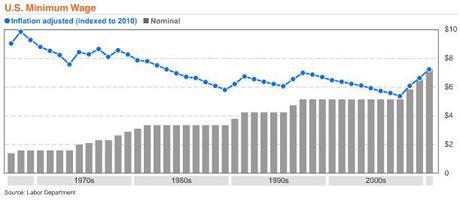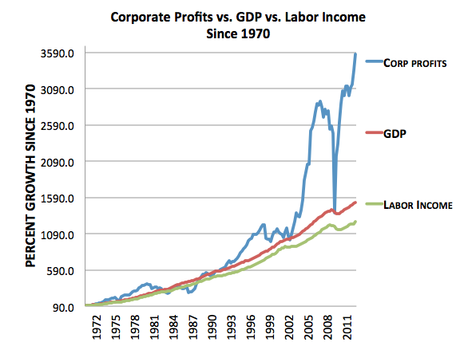While watching this debate on raising the minimum wage in the U.S., one commentator made a point that deserves further recognition on this issue. When asked why economists are so split on the issue of job losses and the minimum wage, Jack Temple, a policy analyst at the National Employment Law Project, points out more and more evidence in research is showing there is a positive effect on the economy when the minimum wage is increased and more economists are beginning to realize this. The more research is done, the more minds are changed to the truth.

Not a living wage. Not even close.
The problem, however, is the level of paradigmatic belief among economists when little evidence and research existed in this area was so heavily to the contrary. The hurdle in making this change is getting people to abandon belief in the face of new facts that disprove long held notions originally based on seemingly common sense assumptions.
Why people believed in the myth is easy to see. We assume employers are spending everything they must on wages and have no more profits to spare on this area of the balance sheet. If they are forced by law to spend more on wages, job losses occur.
And therein lies what we are now learning is the faulty assumption: employers have plenty of profit left over for higher wages, they just choose to inflate the salaries of the minority at the top instead of the majority at the bottom.
And this is leading to more and more economists dropping the belief of the past and accepting the truths of the present. Take a look at the evolution of economists being polled on this issue from its own subhead on Wikipedia’s minimum wage section:
According to a 1978 article in the American Economic Review, 90 percent of the economists surveyed agreed that the minimum wage increases unemployment among low-skilled workers.[81]
A 1992 survey by published in the same journal revealed 79% of economists in agreement that a minimum wage increases unemployment among young and unskilled workers.[82]
In 2013, a diverse group of economics experts was surveyed on their view of the minimum wage’s impact on employment. Thirty-four percent of respondents agreed with the statement, “Raising the federal minimum wage to $9 per hour would make it noticeably harder for low-skilled workers to find employment.”
Yes, there is money there to cover raising the minimum wage.
From 90% to 34% and clearly continuing to fall. Probably took a while for people to believe the earth orbited the sun and wasn’t actually flat but new scientific facts eventually won the day over faulty beliefs.
The information on minimum wage and job loss is expanding as are corporate profits. This combination is leading to more anger at the incredibly low level the minimum wage has fallen to over time relative to inflation (as shown above). As people see Wall Street continue to hit record highs and show no ongoing ill effects from the Great Recession, they will question more and more why this stock boom isn’t “trickling down” in the form of higher wages and lower unemployment?
And the reason this anger is growing is because the science and facts are changing. The truth is the world is not flat, the sun does not orbit the earth, and raising the minimum wage is not a job killer. And for those that continue to believe the contrary, as the old saying goes, I have a lovely bridge in a wonderful location I think you might be interested in buying.


